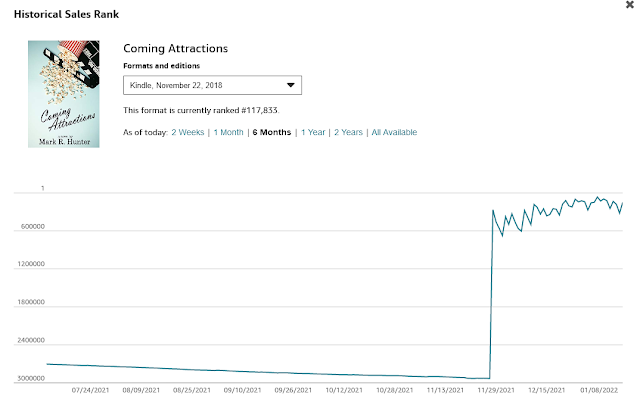I embarked on a fun experiment at the end of November, and by fun I mean it wasn't much fun, and by experiment I mean I had no idea what I was doing.
One of my goals has been to increase book sales, a goal for most authors. The problem is, when it comes to sales an author is competing with--well, almost all those other authors. Writers don't like to think of themselves as being in competition. Writing can be tough, and selling--well, that's way worse. So we support other writers, because we know just how hard it can be.
That doesn't change the fact that there are only so many readers, seemingly fewer all the time ... and a lot of those readers are writers. They can read only so many books--I only managed about a dozen or so last year. So, while we'd like all authors to succeed, we all have to fight to be heard ... I mean, read.
Social media, once a great way to get the word out, has in the last few years bombed. Why? Because the people who run social media sites have realized they can get money from people who are trying to get the word out. As a result, they've changed things around so that an author finds it almost impossible to reach people on the internet, unless they pony up some cash, first.
And most of us can't afford a pony.
 |
"Wait ... no ponies?"
|
So I tried promotion websites, and I tried Facebook Ads. Both gave me a few more sales, but not enough to justify the money I spent. Here's a fun fact, kids: If you spend more on advertising than you make in sales, it's bad. (It does sometimes work in the short term, like those "loss leaders" offered in stores.)
And so I turned to Amazon Ads.
Honestly, I'd rather sell direct, through our website or an independent bookstore. I'd also rather eat chocolate for all meals and be 25 years old again, forever. But never mind that--in this case we're talking about Amazon, the Godzilla of online selling. (I've heard Apple is the second biggest online bookseller.)
Figuring out how to run an Amazon ad is hard.
I mean, driving in a NASCAR race when you've never actually driven at all hard.
I had to learn about impressions, clicks, targeting, keywords, and, most important of all, ACOS.
That means Advertising Cost of Sales. In other words, how much does it cost you to sell a book? If ACOS is over 100, you're spending more money on ads than the book itself sells for. This is bad. If your ACOS is right at 100 you're still in trouble, because Amazon takes a cut--you're still spending more than your' making. The best number is right around 30, give or take, so you're making at least a little money.
I decided to experiment with my latest published novel, Coming Attractions. I set up an Amazon ad for the book, which hasn't sold a single copy through Amazon since November--of 2020.
On November 27 of 2021, my Coming Attractions e-book Amazon rating was 2,931,646. That's almost three million books selling better than mine. On November 28, the rating was 264,568. It peaked on New Year's Eve at 63,798. That was the book's highest Amazon ranking ever, including when it was first published--when I labored long hours to publicize it.
My goal for last year was to sell an average of one copy of our books every day. It didn't happen. In December it did: 37 e-book copies and two print copies of Coming Attractions, and one copy of The No-Campfire Girls sold in a little over thirty days. Here's what it looked like:
After a few weeks of joy and celebration I checked my numbers, and what I found made me very unhappy.
I was indeed selling a lot of books, but when I checked the ACOS, I learned that for every 99 cent e-book I sold, I was spending almost nine dollars to advertise it. This, for those of you who don't care to do the math, is unsustainable, unless you're a millionaire who's not concerned about spending money. I'm not a millionaire. I don't think I'm even a thousandaire.
So, like any sharp businessman, I panicked.
I spent the next several days tweaking all the details, including the list of terms I mentioned earlier. My sales dropped, but as of the first full weekend of January I've gotten my ACOS down to 56%. For me that's about breaking even, so still not great, but at least I'm not bleeding money. They don't make bandages for that.
I'm going to try again, of course, this time going in a little wiser. I haven't decided whether to try one of my other published books, or wait until the next new one comes along, but for once in my life I haven't been cowed by math. Much. I should add that most people who use Amazon ads say it's pretty common to have high ACOS ... ACOS's? ... at first, although I suspect my early numbers would have made them faint.
If you decide to try it, my best advise is to learn everything you possibly can about the process, first. The homework might save you some cash. How have you other authors been doing in your sales attempts? Any tips?


























